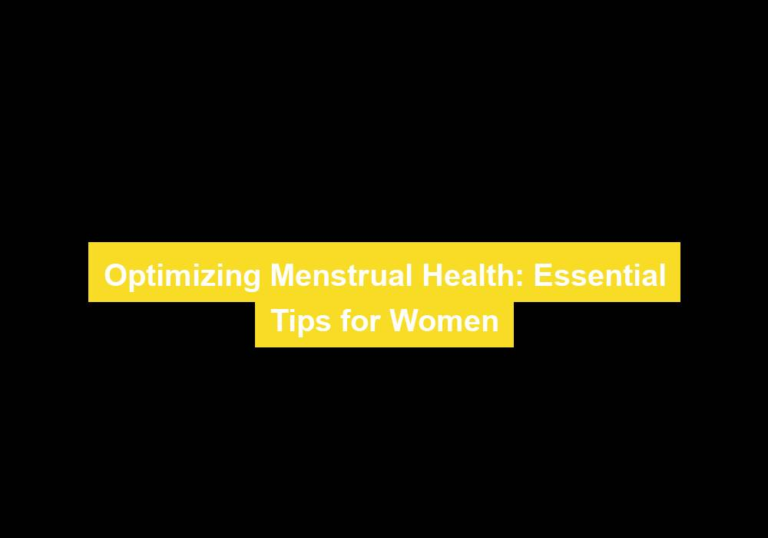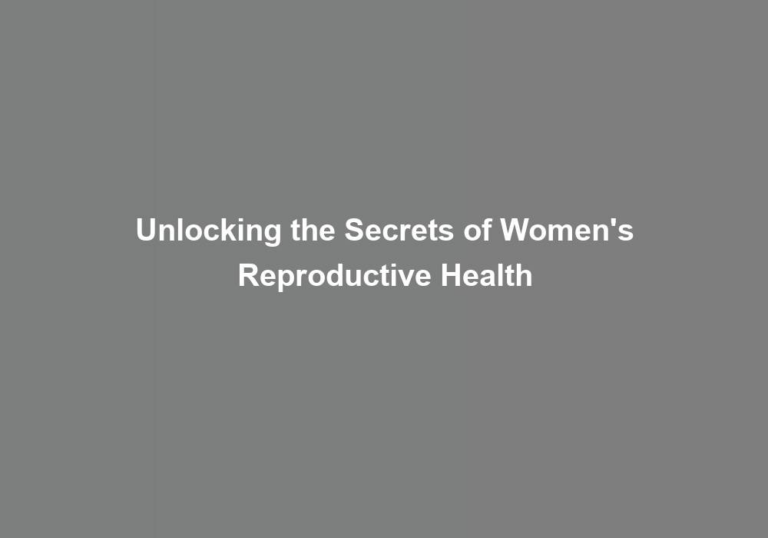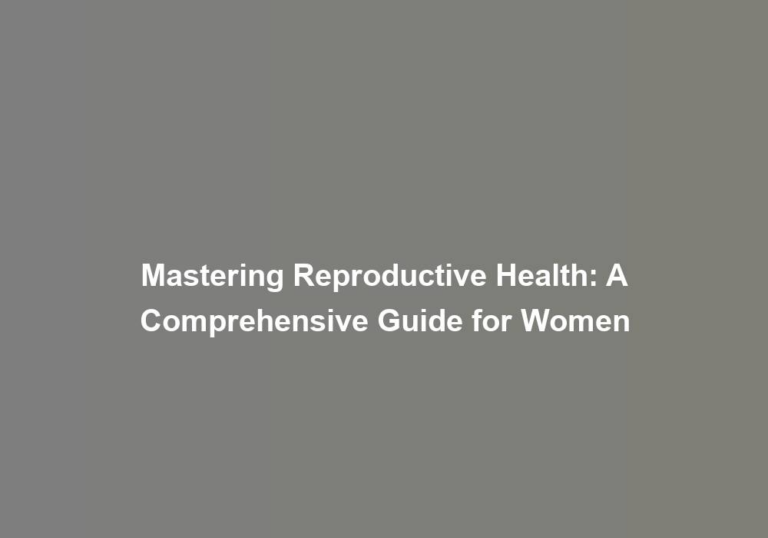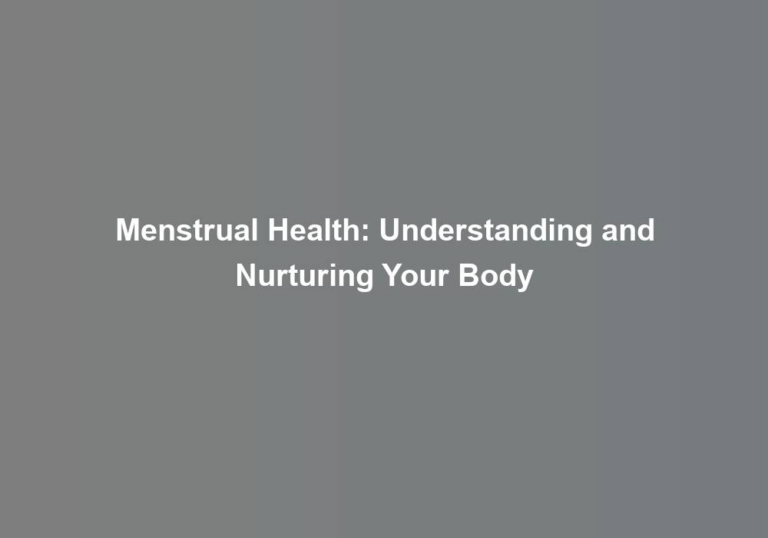Unlocking the Power of Fertility Tips for Reproductive Health
When it comes to unlocking the power of fertility, understanding the basics, making simple lifestyle changes, and incorporating the right nutrients can significantly impact your reproductive health. But how exactly do these factors affect fertility? What are the specific steps you can take to optimize your chances of conception? In the following discussion, weG??ll explore practical tips and evidence-based strategies to support your reproductive journey, from managing stress to enhancing your fertility through exercise and nutrition.
Understanding Fertility Basics
Understanding the basics of fertility can help you make informed decisions about your reproductive health and overall well-being. LetG??s start by debunking some common fertility myths. First, you may have heard that you can only get pregnant on the day of ovulation, but the truth is that sperm can survive in your body for up to 5 days, so the fertile window is actually about 6 days long. This brings us to the next point – understanding ovulation. Ovulation is the release of an egg from your ovary, typically occurring around the middle of your menstrual cycle. ItG??s crucial to recognize the signs of ovulation to identify your most fertile days.
Another essential aspect of understanding fertility is tracking your menstrual cycle. By keeping track of your cycle length, basal body temperature, and cervical mucus changes, you can better predict when ovulation will occur. This knowledge can significantly increase your chances of conceiving.
An understanding of your reproductive systemG??s anatomy is also vital. Knowing how your reproductive organs function and interact can empower you to take charge of your fertility and seek help if needed.
As you delve into the realm of fertility, remember that there is no one-size-fits-all approach. Each personG??s body is unique, and factors such as age, lifestyle, and overall health play a significant role in fertility. By seeking knowledge and understanding the basics of fertility, you are taking proactive steps towards optimizing your reproductive health.
Lifestyle Factors and Fertility
YouG??re probably aware that lifestyle choices can significantly impact your fertility. What you eat, how much you exercise, and how you manage stress can all play a role in your reproductive health. Research has shown that making positive changes in these areas can increase your chances of conceiving.
Diet and Fertility
Improving your diet can significantly impact your fertility and reproductive health. Nutrition plays a crucial role in ovulation and conception. Here are some dietary tips to enhance your fertility:
- Balanced Diet: Ensure your meals include a variety of fruits, vegetables, lean proteins, and whole grains to provide essential nutrients for reproductive health.
- Healthy Fats: Incorporate sources of healthy fats, such as avocados, nuts, and olive oil, which can support hormone production and overall reproductive function.
- Limit Processed Foods: Minimize the consumption of processed foods and sugary snacks, as they can disrupt hormonal balance and negatively affect fertility.
- Hydration: Stay well-hydrated by consuming plenty of water and herbal teas, as proper hydration is essential for reproductive processes.
Exercise and Conception
Making positive lifestyle changes, including regular exercise, is key to supporting your reproductive health and enhancing your chances of conception. Prioritizing preconception fitness through exercise can have a significant impact on your fertility journey. Research suggests that women who engage in moderate-intensity exercise for 30 minutes or more, most days of the week, may have improved fertility. However, itG??s important to strike a balance, as excessive high-intensity workouts could potentially hinder conception. HereG??s a helpful guide to understanding exercise frequency:
| Exercise Frequency | Description |
|---|---|
| Low | 1-2 days/week |
| Moderate | 3-4 days/week |
| High | 5-7 days/week |
Stress and Reproductive Health
Dealing with stress can significantly impact your reproductive health and fertility journey, making it essential to understand and manage its effects as part of your preconception lifestyle. Stress reduction is crucial for optimizing your chances of conception. Here are some relaxation techniques to help you manage stress and support your reproductive health:
- Practice mindfulness meditation to alleviate anxiety and promote a sense of calm.
- Engage in deep breathing exercises to reduce stress and enhance relaxation.
- Consider yoga or tai chi, which can help reduce stress and improve overall well-being.
- Prioritize self-care activities such as reading, taking a warm bath, or listening to soothing music to unwind and alleviate stress.
Incorporating these stress reduction and relaxation techniques into your daily routine can positively impact your reproductive health and fertility journey.
Fertility-Boosting Foods
To enhance your reproductive health, consider incorporating fertility-boosting foods into your diet for improved chances of conception and overall well-being. Nutrition plays a crucial role in hormonal balance and conception. Including specific foods in your diet can positively impact your fertility. Here are some fertility-boosting foods that you should consider adding to your meals:
| Fertility-Boosting Foods | Benefits | Recommended Intake |
|---|---|---|
| Leafy Greens (Spinach, Kale) | Rich in folate and iron, which are essential for reproductive health | 1-2 servings daily |
| Berries (Blueberries, Raspberries) | Packed with antioxidants that help protect eggs and sperm from damage | 1 cup daily |
| Fatty Fish (Salmon, Sardines) | Excellent source of omega-3 fatty acids, vital for regulating hormones and improving egg quality | 2-3 servings per week |
These foods are not only delicious but also provide essential nutrients that can positively impact your fertility. By incorporating a variety of fertility-boosting foods into your diet, you can support your reproductive health and increase your chances of conception. Remember to consult with a healthcare professional before making significant changes to your diet, especially if you have specific dietary restrictions or medical conditions. Your journey to improved fertility starts with the foods you choose to nourish your body.
Stress Management and Reproductive Health
Managing stress is crucial for your reproductive health, as it can significantly impact fertility. Understanding effective coping strategies and the mind-body connection is essential in navigating the challenges of stress. Research shows that finding healthy ways to manage stress can positively influence your reproductive health.
Stress Impact on Fertility
Understanding how stress impacts fertility is crucial for anyone trying to conceive, as it can have a significant influence on reproductive health. Stress hormones, such as cortisol, can disrupt reproductive function, making it harder to conceive. To address this, consider incorporating meditation into your daily routine. Research suggests that meditation and fertility relaxation techniques can help reduce stress levels, potentially improving your chances of conception. Additionally, seeking support from friends, family, or a support group can provide emotional relief and a sense of belonging during this challenging time. Engaging in enjoyable activities and hobbies can also help alleviate stress and promote overall well-being. Taking proactive steps to manage stress not only supports your reproductive health but also contributes to your overall quality of life.
Coping Strategies for Stress
If youG??re experiencing stress while trying to conceive, implementing effective coping strategies is essential for maintaining your reproductive health and overall well-being. Stress relief is crucial for mental wellness, especially during your fertility journey. Consider incorporating relaxation techniques such as deep breathing, meditation, or yoga into your daily routine. These practices can help reduce stress hormones and promote a more balanced emotional state. Additionally, finding support through counseling, support groups, or talking to a trusted friend or family member can provide an outlet for expressing your feelings and gaining perspective. Engaging in enjoyable activities, practicing self-care, and setting realistic expectations can also contribute to your mental well-being. Prioritizing your mental wellness is an integral part of nurturing your reproductive health and increasing your chances of conceiving.
Mind-Body Connection
Experiencing stress while trying to conceive can significantly impact your reproductive health, making it essential to understand the mind-body connection and how stress management can affect your fertility journey. Taking steps to manage stress can positively influence your reproductive health. Consider incorporating the following techniques into your routine:
- Meditation techniques: Engage in mindfulness meditation or guided visualization to reduce stress and promote relaxation.
- Breathing exercises: Practice deep breathing or diaphragmatic breathing to help calm your mind and alleviate stress.
- Yoga: Explore fertility-focused yoga poses and sequences designed to reduce stress and support reproductive health.
- Journaling: Keep a fertility journal to express your thoughts and emotions, promoting self-awareness and stress relief.
Exercise and Fertility
Regular physical activity plays a significant role in promoting fertility and reproductive health. Exercise benefits are not only limited to physical wellness but also extend to reproductive health. Engaging in regular exercise can help in managing stress levels, maintaining a healthy weight, and regulating hormone levels, all of which are crucial for fertility. However, itG??s important to strike a balance as excessive exercise can have the opposite effect and lead to fertility challenges.
| Exercise Type | Frequency |
|---|---|
| Cardiovascular | 3-5 times a week |
| Strength Training | 2-3 times a week |
| Mind-body exercises | 1-2 times a week |
Cardiovascular exercises such as jogging, swimming, or cycling can enhance blood flow to the reproductive organs, while strength training exercises like weightlifting and yoga can improve overall physical health, including reproductive function. Mind-body exercises such as yoga and meditation can also help in reducing stress, which is known to have a negative impact on fertility.
ItG??s essential to remember that every individual is different, and what works for one person may not work for another. Consulting with a healthcare provider or a fitness professional can help in creating a tailored exercise plan that suits your specific needs and fertility goals. Remember, the goal is to find a balanced exercise routine that supports your overall well-being and reproductive health.
Fertility-Enhancing Supplements
To support your reproductive health and fertility goals, incorporating fertility-enhancing supplements into your daily routine can provide valuable nutritional support. When it comes to hormonal balance and overall reproductive wellness, these supplements can play a significant role in optimizing your fertility journey. Here are some key fertility-enhancing supplements to consider:
- Folic Acid: This B vitamin is crucial for women trying to conceive as it supports healthy fetal development and can help prevent birth defects.
- Omega-3 Fatty Acids****: Essential for regulating reproductive hormones and enhancing egg quality, omega-3 fatty acids are found in fish oil and can be beneficial for both men and women.
- Coenzyme Q10 (CoQ10): Known for its antioxidant properties, CoQ10 can support egg and sperm health by protecting against oxidative stress and promoting energy production within cells.
- Vitamin D: Adequate levels of vitamin D are essential for hormonal balance and reproductive health. ItG??s important to ensure you are meeting the recommended daily intake, especially if you have limited sun exposure.
Incorporating these fertility-enhancing supplements, along with a balanced diet and a healthy lifestyle, can provide the nutritional support your body needs to optimize fertility. However, itG??s important to consult with a healthcare professional before adding any new supplements to your routine, as individual needs may vary. By taking proactive steps to support your reproductive health, you are empowering yourself on your fertility journey.
Conclusion
So, youG??ve learned all about the power of fertility and how to enhance your reproductive health. ItG??s as simple as making a few lifestyle changes, eating the right foods, managing stress, and taking supplements, right? Well, unfortunately, we all know that life isnG??t always that simple. But with determination and the right knowledge, you can take steps to unlock the power of fertility and improve your chances of conceiving. Good luck on your journey to parenthood!







